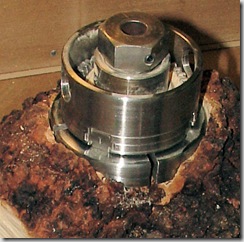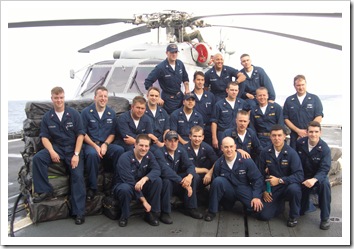In my previous profession, I was one of the military's top experts in a fairly unusual field - Information Warfare.
If you have only a vague notion of what IW might be, well, don't feel bad - you're in the majority. Even folks within the community struggle to understand just what exactly comprises the specifics of their field and there are many, many definitions, some mutually exclusive. In a nutshell though, Information Warfare is simply the codification and acknowledgement of something that has been around since man first crawled out of the primordial ooze - to wit: information is power.
In combat, those with control over the information flow win. If you can prevent the accurate and timely acquisition, processing, analysis, and distribution of information by the enemy, while preserving those things within your own force structure, you'll win. I'm not revealing any great military secret here, commanders have known this fact since, well, forever. That's why, in modern combat, it's a truism that the most dangerous soldier is the one with the radio - it's also why he tends to get shot first.
Commanders, military planners, and tacticians have always striven to control the information flow, both within their own organizations and within the enemy's, with varying degrees of success. And by control I don't necessarily mean restrict, what I mean is manage. Within an information gathering organization, such as any intelligence agency, it is imperative to not only acquire information, but to also determine it's validity - and you do that by examining each piece of data for certain criteria, such as relevance to the current and anticipated situation, it's accuracy as compared to supporting data and analysis, timeliness, level of detail, and a number of other factors. Over the millennia there have been those forces that were extremely good at this sort of thing, and many more who were not. And up until the advent of 'modern conflict' this process has been more art form and natural talent than any sort of science. However, around WWII and the beginning of modern information systems, intelligence organizations began to codify the process and found that even average people could be trained to think this way - to apply the science of critical thought to the acquisition and processing of information. And at the height of the air war in Southeast Asia, during the Vietnam conflict, a Colonel named John Boyd came up with a method of critical analysis called the OODA Loop, or more properly The Boyd Cycle. OODA, for Observe, Orient, Decide, Act. Loop, because done properly this is a continuously repeating process. Here's a picture of Boyd's concept:

When I designed tactics and taught warfighters how to use them, I spent an entire week on this one concept alone, because it was that critical. Those that can continuously and reliably apply this process have a significant tactical advantage over their opponents, be that opponent a single fighter aircraft or an entire army. You don't have to be particularly fast or accurate at the process, only faster and more accurate than your adversary.
When Boyd retired from the Air Force, he went into business and applied this same concept - and was highly successful, as you might imagine. Businesses that can implement and execute the principles of the OODA loop have a significant advantage over their competition. An organization that can observe and accurately analyze its environment, orient and position itself within that environment and anticipate changes and trends, make decisions based on that orientation, and then act decisively - and then observe how those decisions influence the environment and repeat the cycle - will almost inevitably succeed. Again, no great secret here, but its amazing how few organizations do this well.
Observation is the single most critical step in the OODA loop. If the acquired data is flawed, incomplete, incorrect, or outdated, then your orientation in the environment is mostly likely going to be incorrect, and thus your decisions and resulting actions. Because the process is a loop, it should be self correcting, however due to human nature and bias what often happens is that instead of self correction a decision making loop based on bad information becomes self reinforcing.
Need a big, real world example? Iraq used to have weapons of mass destruction - this data is accurate, complete, and verified. Unfortunately, by the beginning of the current conflict, it was also out of date. By failing to ask ourselves critical questions about what we thought we actually knew - then observe and reorient within the changed environment - we made poor decisions. The resulting actions of which are going to be with us for a very long time.
I see this same failure of critical thought on an individual level every day. All of us are capable of critical thought - capable of observing, orientating, deciding, and acting critically - and yet few truly do this in their personal lives. When information arrives, how many folks ask themselves: How was this information acquired? Is it complete? Is it accurate? Is it biased. Is it relevant? Is there enough detail? Do I accept it because it reinforces what I think I know, or do I reject it for the same reason? How can I verify it? How can I test it? If I can't test and verify the information, do I accept it anyway? If so, why?
Those who fail to ask themselves such questions place themselves and those who depend on them, at a significant disadvantage - they will always be at the mercy of those who can observe the universe critically, adjust their worldview appropriately, decide and act. Those who allow themselves to be manipulated through the use of information, are always at the mercy of those who control it - and now you know what Information Warfare really is, and why it is the single most powerful weapon ever fielded.
What brings this to mind for me today (not that this subject is ever very far from my thoughts), is the topic of memes talked about on the various blogs I read and Senator Barrack Obama. Or more specifically, the rather large amount of viral data, memes if you will, circulating through the information sphere that are accepted as fact, and yet are easily verified as incomplete, out of date, irrelevant, lacking in precision, or just plain false. For example: the picture, widely circulated via email, purporting to show that Obama disrespects America because he didn't place his hand on his chest during the National Anthem. Easily proved false, and yet widely accepted by otherwise intelligent folks as true. But what really got me thinking about this subject is the Reverend Jeremiah Wright. Over the last several months the man has been vilified for a number of sermons he gave - or rather sound bites taken from his sermons and deliberately broadcast out of context.
For example Wright was widely quoted as saying that the U.S. had brought the September 11 attacks upon itself and "America's chickens are coming home to roost..."
People were incensed, outraged, appalled. Wright was denounced as unAmerican and unpatriotic. Because Barrack Obama attended Wright's church, he was, and is, denounced as unAmerican and unpatriotic. And yet, and yet, how many folks took that statement, out of context, as verification of their own prejudices and biases without once applying any degree of critical thought. Is this an accurate quote? Is it complete? In what context was it made? Is it relevant, relevant to me, relevant to the presidential campaign, relevant to the nation at large? Is it timely and/or is the timing suspicious? And etcetera. How many folks actually watched the sermon in it's entirety? Based on my own observations, damned few that's how many. Because if they had, they couldn't have missed that Wright was quoting the ambassador from Iraq - under Saddam's administration - as an example of how other people see America.
However, ask yourself a question here, what if he was condemning American foreign policy? What if he actually was saying that by funding and equipping Saddam Hussein during the Tanker war against Iran, or by funding and equipping the Mujahedeen during the Soviet invasion of Afghanistan, or that by favoring and condoning Israel's treatment of the Palestinians, America had laid the ground work for the attacks of 9/11? Seriously, so what? Is this a new idea? Is the observation of such things in and of itself unpatriotic? Is it actually incorrect? Is any criticism of the United States by a US citizen grounds for national outrage? Really?
Wright has also spoken out against racism, and disfranchisement, and prejudice, and a number of things that are important, and personal, to his flock. Should he have been more polite about it? Is it his tone that's unpatriotic? Or his passion? Or is he off base; is what he's saying wrong? Is prejudice, and racism, and bias gone from America? Has poverty been stamped out? Or disenfranchisement?
Or is he saying things that we as Americans don't want to hear?
If we fail to observe critically, if we disregard information because it doesn't fit with our precious opinions of our own selves and our nation, then we will continue to orient ourselves poorly within the global and national environments, and as a result we will continue to make decisions and implement actions that place our nation and a significant fraction of our population at a significant disadvantage.
Wright hasn't said one thing publicly that isn't true, or at least reasonably correct - within the proper context. He has also said, yesterday as a matter of fact, that reconciliation means "we embrace our individual rich histories," and that it also means removing "any teaching of superiority, inferiority, hatred or prejudice" and recognizing that each person "is one of God's children ... no better, no worse." While, I'm not a religious person and am somewhat ambivalent on the subject of a Supreme Being - I can accept and embrace Wright's statement in the context given and admire him for his position.
Predictably though, those comments have not received nearly as much attention as those that reinforced popular perception. Those that want to find a reason to vote against Obama, will. Period. Even if it's not in their best interest, a significant number of Clinton democrats claim that they will either not vote, or vote for McCain, if Obama wins the Democratic nomination. In other words, they will take actions contrary to their own interests, based on poor decisions, derived from an incorrect orientation, due to a failure to observe the environment critically and without bias.
Then they'll spend the next four years bitching about how the Republicans stole yet another election - before the cycle begins again.
I'm not saying that you're an idiot if you don't vote for Obama. I'm not saying that you should vote for him, or that I will either for that matter. What I'm saying is: Observe, orient, decide, act - i.e. think! Gather data critically. Question the information. Verify your facts, for crying out loud - then make your decision. Because your observations, orientation, decisions, and actions affect me, and that makes it personal.
And stop forwarding viral email, there's enough bad data in the world without making it worse.


















